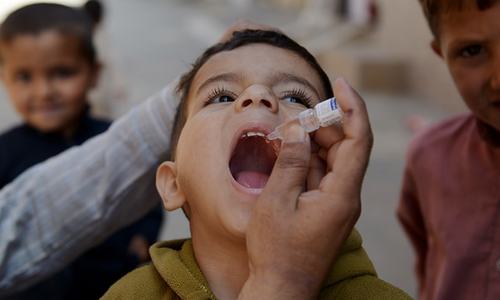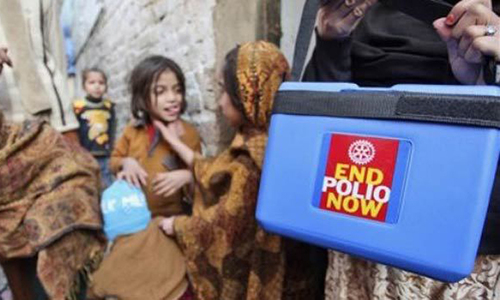HYDERABAD: Resurgence of polio cases in Sindh — 17 out of 111, this year’s total until Dec 22 — indicates that poliovirus continues to remain a national burden while state of vaccination in Sindh paints a bleak picture as the province ranks second after Khyber Pakhtunkhwa’s 73 cases.
The unyielding virus brings into question the vaccination coverage under routine immunisation (RI) through Expanded Programme on Immunisation (EPI) in the province, since below-par coverage makes achievement of targets of Sustainable Development Goal (SDGs) increasingly difficult.
UN’s 17 SDGs — targeted to be achieved by 2030 — cover areas of social sector for a sustainable future for all. And of the 17, SDG-3 directly addresses “good health and well-being,” having 12 targets that could be met through vaccination to end preventable deaths of newborns and children under five years of age, reduce maternal mortality, end epidemics of AIDS, tuberculosis, malaria and neglected tropical diseases, combat hepatitis and reduce one third premature mortality from non-communicable diseases through prevention and treatment.
In the just-concluded five-day province-wide campaign, except for Karachi, that ended with further two days of catch-up exercise, 6.4 million (94.5 per cent of target) out of 6.78m children had been vaccinated.
In Karachi, one million were vaccinated out of 2.3m children. The catch-up drive in the metropolis was to end on Dec 22. A total of nine million children were to be vaccinated against poliovirus across Sindh in a campaign that started from Dec 16.
The back to back campaigns are launched by Emergency Operation Centre (EOC) for polio eradication either as part of provincial or national immunisation drive in addition to RI which covers 11 different vaccinations including polio. Typhoid vaccine is also now part of EPI following recent surge in typhoid cases, originating in Hyderabad.
Dr Iqbal Memon, a member of National Immunisation Technical Advisory Group for Polio regrets that unless 90pc-plus coverage of RI is achieved gaps will keep making things difficult. “We will have to grapple with this national burden in shape of polio. A polio-affected child doesn’t only fail to become a useful member of society but he also entails a huge economic cost for the entire life in community,” he contends.
He thinks that “We as a society doesn’t take it seriously as people have more important chores than taking a child to a fixed EPI centre for vaccination”. He doesn’t absolve health department of its responsibility either and says “EPI centres don’t have a proper visibility or lack conducive environment. We need to make them more visible”.
He claims there are gaps in coverage. “There are cases where on account of community’s anger vaccinators mark child even without administering polio drops and this makes the entire coverage doubtful.”
Newborns and children under five years of age are vaccinated under RI at fixed centres in hospitals and other locations of health department under EPI that works under a separate project director. Through lady health workers (LHWs) the outreach is ensured, too.
EOC-run polio campaigns are aimed at augmenting EPI which is an important arm of provincial health set-up but it is yet to make a strong impact insofar as achievements of RI targets are concerned.
EPI remains understaffed without a rationalised human resource at its disposal that leads to various gaps in the system. Global health watchdogs, concedes an officer, only consider 90pc-plus RI coverage an achievement and regard what is below as ineffective.
A plain reading of Pakistan Demographic Health Survey (PDHS) reveals that the percentage of children receiving all basic vaccinations has visibly grown, increasing from 35pc in 1990-91 to 66pc in 2017-18 as the coverage has sharply increased over last five years from 54pc in 2012-13 to 66pc in 2017-18.
According to the survey’s findings, regional variation indicates that all basic vaccination coverage is most prevalent among children of Punjab (80pc) whereas the coverage is the lowest in erstwhile Fata (30pc) and Balochistan (29pc). With 49pc coverage mark, Sindh is only above Balochistan despite having a large force of LHWs and vaccinators.
The number of vaccinators has increased from 2,700 to 4,000 with recent induction of 1,300 more vaccinators, who are under training currently. Sindh still witnesses outbreak of measles that cause death in children like polio. Only last year four children had died in Benazirabad district following doses of measles vaccine.
More vaccinators needed
“Given Sindh’s population and its area we need more vaccinators to have 100pc RI coverage besides polio campaigns, otherwise the situation will remain dismal,” remarks a former Sindh health secretary.
He points out that Sindh government aims to integrate different health programmes under one umbrella through director general of health services.
“The coverage figures under EPI are, indeed, not encouraging and that’s why global monitors don’t look fully satisfied,” admits an officer and adds “although figures claim that 70pc RI is achieved, this looks highly doubtful.”
He agrees that EPI needs to be strengthened with a strong outreach network to have desired 90pc-plus coverage to be in a commanding position in Sindh after Punjab.
The existence of poliovirus in high-risk mobile population (HRMP) remains challenging as it contributes to the virus spread in Sindh, say officials. The HRMP consists of people who travel frequently between Karachi, Peshawar, Quetta, Qila Abdullah and Qilla Saifullah and are considered to be core reservoirs of poliovirus.
The HRMP, says an official, has the lowest polio vaccination acceptability besides accessibility. “A big component of HRMP — mainly Pakhtun community — has larger concentration in Karachi and Hyderabad,” he adds. Then comes still miss children (SMCs), he informs. The SMCs are children who are unavailable or refusal cases that are constant in Karachi.
Ms Halima Leghari, president All Sindh LHWs and Employees Union, considers the RI coverage through EPI more significant than EOC-run campaigns. “RI covers all types of poliovirus but EPI remains weak,” she says.
She believes that considering area of Sindh at least 10,000 vaccinators are needed and says that 22,000 LHWs could cover only 70pc areas but “this coverage is not properly reflected in documents”.
Even EOC has been witnessing frequent changes that do more harm than good.
An integration of different health programmes with due oversight is said to be under consideration in Sindh to meet challenges confronting health sector.
Merit-based appointments at all levels of health system are significant to ensure performance-oriented service delivery, failing which the goal to achieve SDGs 2030 would remain a distant dream.
Published in Dawn, December 24th, 2019















































